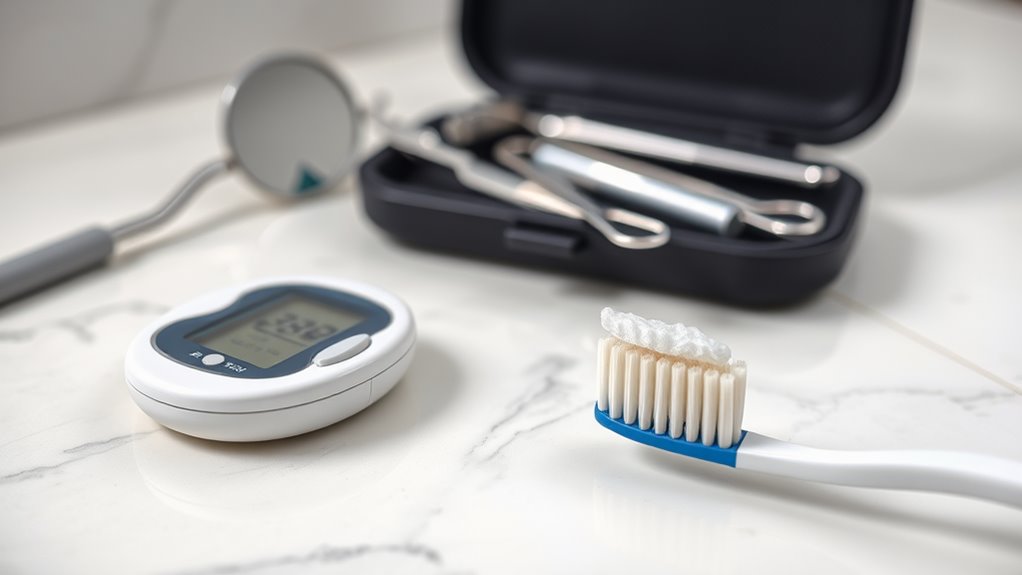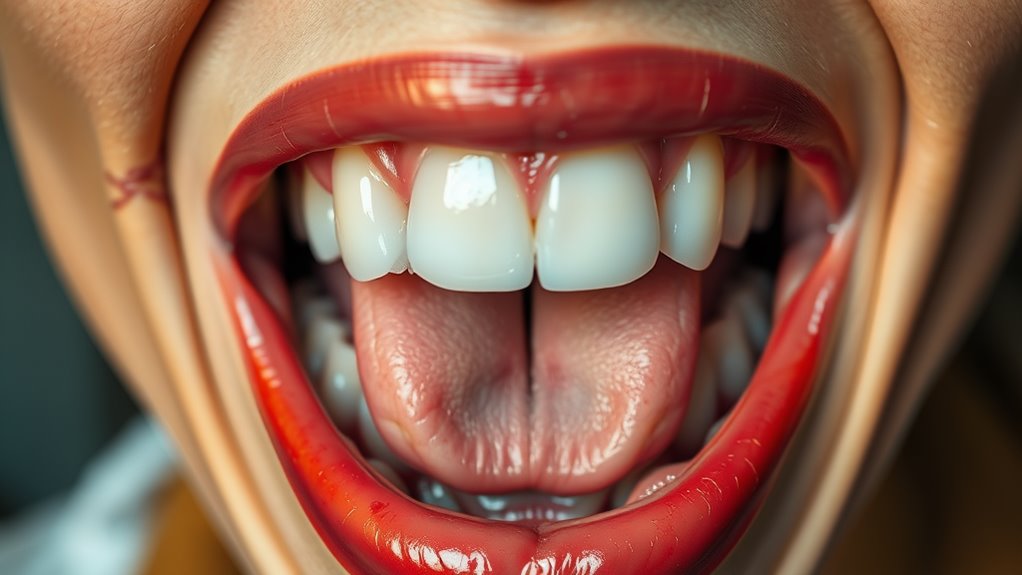The Secret Link Between Diabetes and Your Dental Health!
Diabetes creates a hidden chain reaction in your mouth by weakening your body’s ability to fight bacteria and heal. High blood sugar levels increase glucose in your saliva, feeding harmful bacteria that damage teeth and gums. You’ll face higher risks of gum disease, cavities, infections, and dry mouth. But don’t worry – with proper dental care strategies and coordination between your medical team, you can protect your smile and prevent complications.
Understanding the Diabetes-Oral Health Connection
While many people know diabetes affects blood sugar levels, they often overlook its significant impact on oral health.
When you have diabetes, your body’s ability to fight bacteria becomes compromised, making you more susceptible to infections, including those in your mouth.
If you’re diabetic, you’ll face a higher risk of developing gum disease, tooth decay, and dry mouth.
High blood sugar levels can weaken your white blood cells, which are crucial for fighting infections in your gums and teeth.
You’re also more likely to have slower healing after dental procedures.
The relationship works both ways – poor oral health can make it harder to control your blood sugar levels, creating a challenging cycle.
That’s why maintaining good oral hygiene becomes even more critical when you have diabetes.
Common Dental Problems in Diabetic Patients
Because diabetes affects your entire body, you’ll likely encounter several specific dental problems that require special attention.
The most common issues include gum disease (periodontal disease), which can lead to receding gums and tooth loss if left untreated. You’re also at higher risk for thrush, a fungal infection that causes white patches in your mouth.
Dry mouth is another frequent concern, as diabetes can reduce saliva production. This condition makes you more susceptible to tooth decay and oral infections.
Poor wound healing, a common diabetes complication, can affect your mouth’s ability to recover from dental procedures or injuries.
You might also experience burning mouth syndrome, which causes a painful burning sensation in your gums, tongue, and oral tissues.
How Blood Sugar Levels Impact Your Teeth and Gums
Blood sugar levels play a direct role in your oral health, making it vital to maintain good glycemic control. When your blood sugar runs high, you’ll have increased glucose in your saliva, which creates an ideal environment for harmful bacteria to thrive in your mouth.
These bacteria produce acids that attack your tooth enamel and inflame your gums. High blood sugar also weakens your immune system, reducing your body’s ability to fight off oral infections.
It can slow down the healing process of any mouth injuries and make your saliva glands work less effectively. Additionally, blood vessel thickening, which often occurs with diabetes, can reduce the flow of nutrients and removal of waste products from your gum tissue, making you more susceptible to gum disease and tooth decay.
Essential Oral Care Strategies for Diabetics
Since managing diabetes requires careful attention to overall health, establishing a robust oral care routine is crucial for preventing complications.
You’ll need to brush twice daily using fluoride toothpaste and a soft-bristled brush, paying special attention to the gumline. Floss daily to remove plaque between teeth where your brush can’t reach.
Monitor your blood sugar levels before dental appointments and maintain regular check-ups every three to four months. Clean your dentures daily if you wear them, and remove them at night.
Consider using an antimicrobial mouthwash to reduce harmful bacteria. If you notice bleeding gums, loose teeth, or persistent dry mouth, contact your dentist immediately.
Remember to keep your glucose levels controlled, as this directly impacts your body’s ability to fight oral infections.
Working With Your Dental and Medical Team
Effective management of diabetes requires coordinated care between your medical and dental professionals.
You’ll need to keep both teams informed about changes in your health, medications, and treatments. Make sure your dentist knows your latest A1C levels and blood sugar readings, while updating your doctor about any oral infections or gum problems.
-
Schedule regular dental checkups every 3-4 months instead of the typical 6 months, as diabetics need more frequent monitoring.
-
Provide your dental office with emergency contacts, including your endocrinologist’s number.
-
Keep a detailed log of both your blood sugar readings and any oral health changes to share during appointments.
Remember to tell your dental team about any new diabetes medications or insulin adjustments before procedures, as these might affect your treatment plan.




